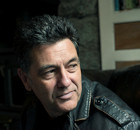
Paul Henry
Poet
Books
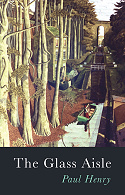
The Glass Aisle
Published by Seren in the early Spring
"This haunting, elegiac collection, about music, and made of music, leaves a reader's mind full of phrases, in both senses - verbal, and tonal - and exactitudes that catch the heart and lodge in the memory" Gillian Clarke
"In this virtuoso new collection, Paul Henry, poacher-like, tracks the journeys of the heart through landscape, love and loss. He takes his place as one of the most important Welsh poets now writing." Carol Ann Duffy
"Paul Henry has much of his compatriot R.S.Thomas's gift, in that poet's later work, for terse, coolly forthright insightfulness." The TLS
"Here is a rich and comforting voice next to you in the dark. Twenty eight poems so beguiling you know not whether they depict ancient folklore or an everyday occurrence in the next but one village" Caught by the River
"This is a poet still at the height of his powers, ten books in. Let the music play on." Wales Arts Review
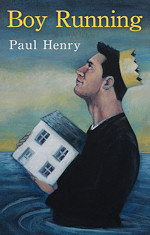
Boy Running
Shortlisted for 'Wales Book of the Year 2016'
"Henry is working at the core of lyric poetry, with love and loss and the 'deeper river'." The Poetry Review
"... an obsessive look at time and all the loss it carries... Henry's rich, wise and regretful poems should be better known than they are and, like his past in 'Usk', this is a good place to begin." The TLS
"Boy Running is a good place to start on Henry's poetry, if you don't already know it, then work backwards for a sense of the power of melancholy and that untranslatable word, 'hiraeth'." The North
"I know of few poets who are as capable of treasuring and portraying fatherhood as well as Henry, ... his most ambitious work to date. I recommend you get hold of a copy." Rogue Strands
A song version of the poem 'Kicking the Stone', co-written with Brian Briggs, can be heard on 'Stornoway's' new album 'Dig The Mountain!' released October 2023. The original poem appears in Paul's collection 'Boy Running'.
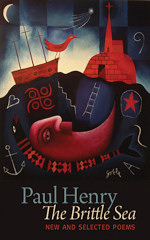
The Brittle Sea
"Henry's poems are often expressionistic, even symbolist ... with formal skill and time and
space-bending panache to boot. The new, previously unpublished poems... represent the
best work of a lyric poet who deserves a wider readership." The TLS
"The Brittle Sea spans a sleek twenty years. Gesturing equally backwards and forwards, it marks Henry's quiet rise as a major lyric poet while whetting the appetite for what is sure to be a very rich later career." Poetry Review
"This is a beautiful, moving book concerned with a preservation and celebration of the past: poignant, yet unsentimental. It is a must for fans of Henry's work and a thoughtful selection for readers coming to his poems for the first time." New Welsh Review
"I have witnessed exactly the scene he describes, of a seven-year-old boy suddenly transformed into an independent young man by his first serious haircut... The poem made me cry with a mixture of happiness and sorrow in reliving what Henry captures so well... " Sebastian Faulks on 'Daylight Robbery' - The Guardian (reviewing 'Poems That Make Grown Women Cry')
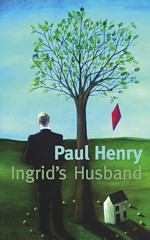
Ingrid's Husband
"A poet's poet, Paul Henry gets the maximum effect from minimum language. The ordinary becomes alive with possibility, comic, moving, magical, compassionate. A sense of the music of words combines with an endlessly inventive imagination." U.A. Fanthorpe
"Paul Henry is the poet I wish I could be. If I ever meet a genie and get three wishes, I'm asking for his musicality, his use of back-story and his ability to create the most haunting resonance." Sheenagh Pugh
"With the purity of a sixteenth-century poet, Paul Henry lets fall his beautiful lyrics like cloaks in the mud of every day. Effortless epiphanies and images gradually break open, releasing a strange power, a dark ocean of longing and loss. His poetry deepens our perception of the world." Hugo Williams
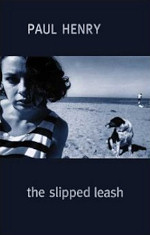
The Slipped Leash
The choices we make - between music and silence, impulse and security; between the "torn land" and the "dazzling sea" - feature strongly in this new collection of poems by Paul Henry. A twenty-first century muse is rehoused in the jazz clubs and seedy hotels of European cities. Yet the loss of a mother, a singer, depicted in a sequence which closes the book, brings back to heart what ultimately matters: that early music which shapes all our longings.
"Henry is a refreshingly original poet, and technically gifted in the making of forms whose tensile minimalism can support profound emotional implications." Poetry Review
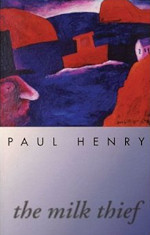
The Milk Thief
"...The haunting music, the cherished objects, the blank landscape of beaches, "the missed trajectories" of space and time all amount to a book which finds, like William Carlos Williams, its brightness in bits of broken glass and fragments of the marvellous..." The TLS
"Henry's great strength is his sense of mystery, his ability to present suggestive and often very beautiful images without dotting all the i's and crossing all the t's.... 'The Milk Thief disarms by stealth." Thumbscrew
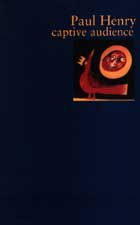
Captive Audience
"...Henry reminds us that extraordinary poetry is to be discovered in the ordinary events of love... there are few contemporary poets who are as confident of their emotional terrain, few as able to praise so uninhibitedly..." New Welsh Review
"Captive Audience is firmly rooted in the ordinary, yet at the same time it reveals the sacredness that
is hidden there." The TLS
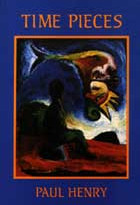
Time Pieces
Time Pieces is Paul Henry's debut collection of poems. Clear-eyed, compassionate, and concerned, he writes movingly about members of his family and community. We meet the brisk, arrogant 'Bigwig', the fragile, elderly 'Audrey in Autumn', along with grandparents, window cleaners, buskers, children, farmers, factory workers, cousins and others. These poems reveal how one is heir to many influences in Wales, and explores the tensions between rural and urban, tourist and local, material and spiritual lives. Many of these themes come together in his fine five-part poem 'Rep', a look, by turns comic and tragic, at the life of a modern slaesman. In contrast to the mere wordplay of many modern poets, Paul Henry's poems are sensitive, humane, and involved in the people and landscapes that surround him.
"A rewarding debut." The Independent on Sunday
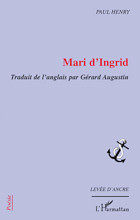
Mari d'Ingrid
Traduit de l'anglais par Gerard Augustin
Paul Henry dit que Mari d'Ingrid est "un livre de fantomes", un livre du "desir et (de) la perte d'amour", la quete et l'egarement d'amour. Fortement enracinee dans le quotidien, cette poesie n'en revele pas moins le sacre qui se cache derriere chaque geste, chaque mot. Le "fantome", c'est le present reminiscent (et le poete se delivre ainsi de sa souffrance), c'est l'image secrete de notre vie, cette image tragique qui resume notre historicite.
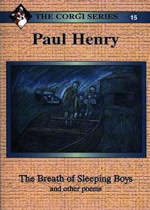
The Breath of Sleeping Boys & other poems
A selection of Paul Henry's work by Meic Stephens, 'The Breath of Sleeping Boys' forms part of the corgi 'Writers of Wales' series.